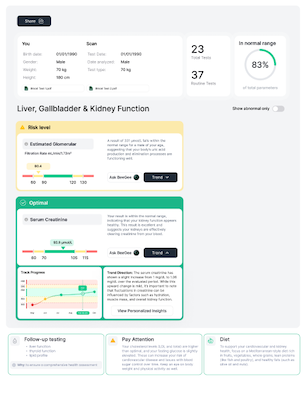Summary:
BloodGPT, a B2B HealthTech startup, has launched an AI-powered platform that drastically reduces doctors’ time spent reviewing lab results while enhancing patient engagement and understanding.
Takeaways:
- Efficiency Boost for Physicians: BloodGPT cuts lab result review time from 4–7 hours to just 30 minutes per week by offering AI-analyzed, clinically supported summaries.
- Empowered Patient Experience: Patients receive interactive dashboards and personalized health forecasts, transforming confusing data into actionable insights.
- Strategic Timing and Team Strength: With rising physician burnout and diagnostic automation needs, BloodGPT enters the market backed by a team with deep clinical, AI, and entrepreneurial expertise.
B2B HealthTech startup BloodGPT has unveiled a healthcare provider solution to streamline lab result interpretations, slashing weekly review time for doctors from 4-7 hours to 30 minutes. The technology will allow to improve patient outcomes and reduce physician burnout in the face of an expected 86,000 specialist deficit.
BloodGPT Built on AI Foundation
BloodGPT offers controlled, verifiable medical AI that serves both sides. For patients, it gamifies health understanding using interactive dashboards and trend tracking that make monitoring engaging. For physicians, it saves time with pre-analyzed results and clinical decision support that integrates seamlessly into existing workflows. AI models GPT and Gemini cross-check each other to reduce mistakes in deciphering complex medical data. This ensures that every recommendation is grounded in verified medical knowledge with transparent reasoning, which is crucial at a time when both patients and doctors increasingly turn to AI for their respective needs.
The platform transforms blood analysis into an engaging experience instead of complex table interpretation. Patients instantly receive a historical health analysis and a forecast with tailored recommendations. If physicians want to use BloodGPT for establishing a diagnosis and developing a treatment plan, their user journey only takes three minutes. The technology reduces the need for follow-up questions and eases the administrative load on health practitioners — freeing them from routine tasks like repeated data entry, manual documentation, and chasing missing patient information.
“There are over 1 million physicians in the U.S, and, according to Stanford research, nearly half of them experience at least one symptom of burnout. Fragmented data between clinics, hospitals, and labs, together with a lack of historical context, make it increasingly difficult to deliver holistic patient care and force doctors to spend more time on administrative tasks. With growing pressure on healthcare systems and a push toward automation in diagnostics, the timing is ideal to position BloodGPT as an augmentation tool that saves time, reduces error, and scales access,” says Nikita Udovichenko, BloodGPT co-founder.
Development Leverages Decades of Clinical, Technical, and Entrepreneurial Knowledge
The team behind the product combines decades of clinical, technical, and entrepreneurial knowledge. Co-founder & CEO Vasilii Lazuka is a visionary entrepreneur with a successful 8-digit exit in enterprise software. Co-founder & CMO Nikita Udovichenko, a biochemist and seasoned founder, brings deep expertise in endocrinology. Head of Product Nata Savaścienka has a strong background in enterprise AI software, and products. Jonathan Kron is strategic adviser for healthcare executives & owners.
“Around 14 billion lab tests are performed in the U.S. each year. Everybody has experienced frustration in receiving results from their doctor. They come in a one-dimensional flat PDF, often scribbled on with illegible comments, using terms that are inaccessible to the layperson. There is no effective ability to compare these results to previous ones to get a better understanding of your health trends. BloodGPT addresses all these frustrations in a friendly way at a time when taking responsibility for your own health is becoming increasingly essential,” says Jonathan Kron, BloodGPT strategic adviser.
Beyond saving time for physicians, BloodGPT significantly increases patient engagement with their health through regular check-ups, contributing to the overall population wellness, according to the company.
Featured Image: Example of the BloodGPT interface. Image: BloodGPT





